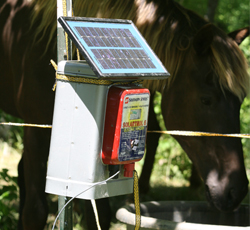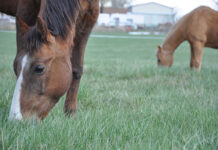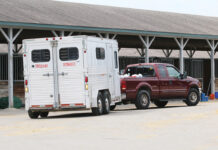 |
One of the most infuriating exercises in futility is when you have a problem with your electric fence. You walk the entire perimeter to see if something’s lying across a rail, check for loose connections, and inspect your ground rods, only to find out your energizer is unplugged. In fact, you have to become an electricity sleuth to figure out many of the disruptions that can occur.
In recent years, manufacturers have come to the rescue with several inexpensive products that can speed discovery of a fence problem. The simplest is the voltage tester. One end sinks into the ground, and the other, a hand-held plastic unit with indicator lights, detects the presence of voltage on the fence at measured amounts.
Another handy tool is a permanent device that hangs on the fence and detects the amount of current. If you have more fence than time, you might want to invest in a diagnostic tool like the Fence Doctor by Zareba Systems that points you toward the location of a short, so you won’t spend an inordinate amount of time looking in the wrong direction.
These tools are generally sold alongside energizers in farm supply stores, or through farm or horse supply catalogs.
Electricity Isn’t Conducting – Now What?
Start at the energizer and work your way out along the fence. Check to make sure the energizer is plugged in and is emitting a snapping sound.
If you’re checking the electricity for the first time and have a problem even though the energizer is turned on, it is probably improperly grounded, the no. 1 problem with faulty electric fences. Check that the three ground rods are:
• the proper type of metal (copper is best)
• spaced at least 6 feet apart
• driven deep enough
• properly connected to each other
• not buried in overly-dry ground
Next, check the connections from the grounding rods to the energizer, then from the wire to the fence. If you still haven’t resolved the problem, you need to walk the fence line and look for the short. You can often hear the snapping noise at the site of the short. If not, look for objects touching the line, such as wet or thick-stemmed weeds, rusty hardware, bent wire touching wood, electric tape disconnected from its insulators and resting on the post or anything against your fence that can interrupt the current.
Check for rusty connections and keep woven wire from bending toward the electric line. Extra-long insulators help solve this problem.
If wet weeds typically grow under your fence line, buy an energizer designed to shock through them. Even then, some weeds touching the fence line can still shrink the voltage, so don’t let them proliferate. Mow beneath the fence line for best results. Remove brush, branches and small tree limbs near the fence with pruning shears.
If the fence looks fine, check any underground wiring connections such as those that run under gates. If not buried deep enough, these can be a problem. Running coated wire through steel pipe works well to keep horses from unearthing it up as they repeatedly walk over it.
Spare Parts
Be sure to keep spare fencing on hand for repairs. Also, buy extra hardware such as connectors to splice fencing, insulators and fence toppers (many youngsters like to pull these off t-posts to play with). These days, you’ll save more money buying a few extra fence supplies up front than paying for the gas for a return trip to the store.
Learn more about Fence Maintenance >>







good and helpful article. not trying to sell anything in particular but giving good tips.
I hate electric fences. They require constant maintenance and if there are power cuts the animals always seem to know they’re off. Plus most of mine learn to ignore the quick pain and then just jump through anyway. Just not worth the hassle.
How about running a ground wire directly to the ground bar in a electrical panel, I keep losing my grounds outside due to frozen ground
I have been using rebar as a grounding rod for about 10 years. Today it quit doing it’s job. I have plenty of AC voltage coming out of the charger, but as soon as I hooked up both fence wires the charger light goes out. Going to install a copper rod tomorrow, and by the way, they don’t have to be driven straight down if there is a problem. A copper grounding rod can be buried a foot deep. That area should be watered infrequently.
I have a Zareba electric fence and couldn’t find information on how to troubleshoot and repair
an electric fence. I was surprised to learn they have certified repair centers in many states
and they can help you troubleshoot or repair your electric fence.
Here’s the link for their certified repair centers:
http://www.zarebasystems.com/customerservice/where-to-buy/certified-repair-centers
Troubleshooting an electric fence:
http://www.zarebasystems.com/resources/expert-tips
My ground wire is popping. Can you tell me what I need to do to fix it? I have had this hotwire working for a couple of years with no problem, but you can hear it popping off at the ground wire. I have searched the internet but cannot seem to find an answer to my problem. Thanks!